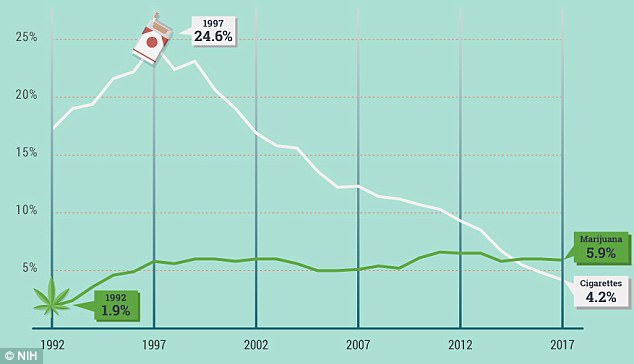The National Institutes of Health (NIH) released its annual Monitoring the Future (MTF) survey results highlighting historic lows of cigarette, heroin and methamphetamine use and increases in vaping and marijuana use among adolescents. The study surveyed over 47,000 students in 8th, 10th and 12th grade in both public and private schools nationwide on their substance use and attitudes towards particular drugs.
Opioids and Illicit Substances
Less than 0.5 percent of the nation’s teens report using heroin or methamphetamine in the past year. A historic low of 2.7 percent of high school seniors reported past year misuse of the prescription opioid Oxycontin and only 2 percent reported past year misuse of Vicodin, the lowest level since its inclusion in the survey in 2002. 12th graders also reported they believe that these drugs are more difficult to access than they used to be. Use of cocaine, synthetic marijuana, and misuse of Ritalin and prescription stimulants all remain very low compared to previous years.
Vaping and e-Cigarettes
Vaping has seen a rapid increase in use, with one in three high school seniors reporting they had used an e-vaporizer to inhale nicotine, marijuana or another inhalant in the past year. The survey data shows that most adolescents (51.8 percent of 12th graders, 59.2 percent of 10thgraders, and 74.8 percent of 8th graders) believe that e-vaporizers contain “just flavoring.” Among high school seniors who use e-vaporizers, more than 10 percent say they use it to inhale nicotine. The data shows that many teens who vape are first time nicotine users and there is evidence to suggest they may eventually transition to cigarette smoking.
Marijuana
Marijuana use has remained relatively steady over the past five years among all ages surveyed, with 5.9 percent of 12th graders and 0.8 percent of 8th graders responding that they use marijuana daily. High school seniors are now more likely to use marijuana daily than smoke cigarettes, as only 4.2 percent of 12th graders smoke cigarettes daily, compared to 24.6 percent 20 years ago. Attitudes about marijuana have significantly changed over the past 20 years, with only 14.1 percent of high school seniors believing there is “great risk” in occasional marijuana use compared to 40.6 percent in 1991. Data also indicates that students in states where medical marijuana is prescribed are more likely to have vaped marijuana or consumed edibles when compared with students living in states that have not moved to legalize medical marijuana.
Alcohol
Binge drinking among adolescents has steadily declined since 1997 among all surveyed ages, but appears to have leveled off in 2017. Binge drinking is defined by MTF as consuming five or more alcoholic drinks consecutively in the past two weeks. Past year use of alcohol among teens has remained consistent from last year’s MTF results, with 55.6 percent of high school seniors reporting past year alcohol use in 2016 and 55.7 percent in 2017. Past month use rates have also remained consistent from 2016 to 2017.
credit:thenationalcouncil.org

